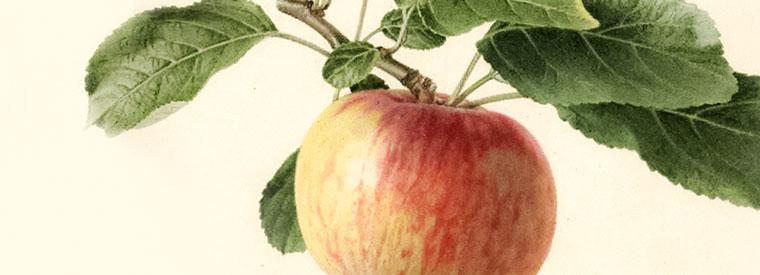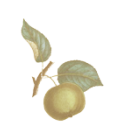From the founding of Jamestown to the time of Washington and Jefferson, every plantation owner made cider, drank cider, and bragged about his cider.

Fruit
COX'S ORANGE PIPPIN was raised by Richard Cox (1777-1845) as a seedling of Ribston Pippin at Colnbrook Lawn, near Slough, Bucks, England, and was noted in 1830. The skin is thin, yet tough, smooth and colored a dull orange-red. As the apple matures, it brightens in color and is often more red than orange. Sometimes there is a surface russeting. The flesh is tender, crisp and yellow, with a sweet, slightly subacid flavor. This aromatic apple is considered one of the classic dessert apples of the world. The flavor is enhanced by ripening off the tree. It bears heavily and annually on a moderately vigorous tree, which is susceptible to scab and mildew. The growth is upright and slender with small leaves that have dull, fine serrations. The bark is a reddish olive color. Since it blooms late and there is a heavy rebloom, it is a reliable bearer in frost-prone areas. Golden Delicious is a good pollinator. The vitamin C content is 10.50 mg/100 gm. Cox's Orange Pippin is a parent of many esteemed varieties, including Ellison Orange Pippin, Holstein, Ingrid Marie, Freyberg, Golden Nugget, Kidd's Orange Red (which is a parent of Gala) and Cherry Cox. Interestingly, the seeds are sometimes loose in the so-called pip pocket and can be heard when shaken. In Virginia, it ripens in September.
Ripening Period
- Early Fall - September


